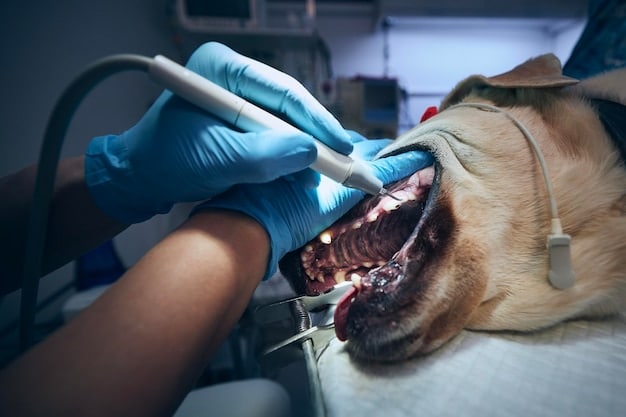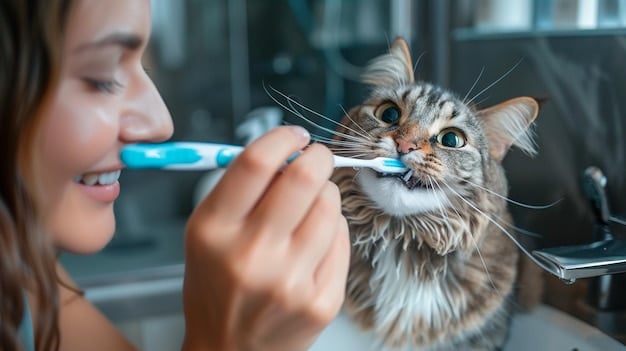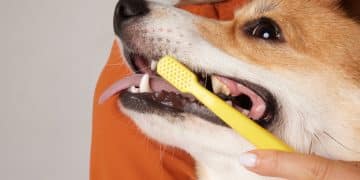Pet Dental Health: Prevention Tips to Avoid Expensive Vet Bills

Anúncios
Dental health for pets is crucial, and preventative measures like regular brushing, dental chews, and professional cleanings can significantly reduce the risk of costly dental procedures down the line.
Maintaining good dental health for pets: preventative measures to avoid costly procedures can seem daunting, but it’s one of the most important aspects of overall pet wellness. Ignoring your pet’s teeth can lead to painful infections, tooth loss, and even affect their heart, liver, and kidneys. Let’s explore how we can proactively care for our furry friends’ smiles and avoid hefty veterinary bills.
Anúncios
Understanding the Importance of Pet Dental Health
Why is pet dental health such a big deal? Well, just like humans, pets are susceptible to dental diseases like gingivitis and periodontitis. These issues can cause not only pain and discomfort but also systemic health problems. Neglecting your pet’s teeth is like ignoring a ticking time bomb.
Imagine the discomfort of a constant toothache. Our pets can’t tell us what’s wrong, so it’s up to us to recognize the signs of dental disease and take action. Let’s delve into the potential consequences of poor dental hygiene in pets.
Anúncios
The Consequences of Neglecting Pet Dental Care
Ignoring your pet’s dental health can lead to a cascade of problems. Here’s a breakdown of what can happen if dental issues are left unaddressed:
- Pain and Discomfort: Dental disease is often incredibly painful, impacting your pet’s quality of life.
- Tooth Loss: Untreated infections can lead to teeth loosening and eventually falling out.
- Systemic Health Issues: Bacteria from dental infections can enter the bloodstream, affecting major organs like the heart, liver, and kidneys.
- Bad Breath: Halitosis is a common sign of dental problems and can be quite unpleasant.
Therefore, it becomes essential to implement a proactive dental health plan for your pets that focus on early detection of problems and proven methods of dental care.
The sooner you address potential dental issues, the less likely these complications are to occur. Taking action early can save you money and improve your pet’s quality of life and longevity.

Establishing a Daily Dental Hygiene Routine for Pets
Creating a daily dental hygiene routine is pivotal in maintaining your pet’s oral health. It’s not as complicated as it sounds. The core of the routine involves brushing your pet’s teeth regularly and providing dental friendly toys which helps prevent tartar buildup.
Regular brushing can dramatically reduce plaque and tartar buildup. Let’s look at techniques and tools that make dental care successful but easy.
Tips for Brushing Your Pet’s Teeth
Brushing your pet’s teeth may feel overwhelming, but it is very doable with the right approach. Here’s how to make the process smoother for you and your pet:
- Use Pet-Specific Toothpaste: Never use human toothpaste, as it contains ingredients that can be harmful to pets.
- Introduce Slowly: Start by letting your pet lick the toothpaste, then gradually introduce the toothbrush.
- Be Gentle: Use soft, circular motions and focus on the outer surfaces of the teeth.
- Make it Positive: Reward your pet with praise and treats after each session.
Consistent brushing is the most effective way to remove plaque and prevent tartar buildup. Combine it with routine visits to a vet you trust to have the best outcome.
Consistency is key. Aim to brush your pet’s teeth daily or at least several times a week to maintain optimal oral hygiene.
Selecting the Right Dental Products for Your Pet
Choosing the right dental products is crucial for supporting your pet’s oral hygiene. Just remember that not all products are created equal. The best products are safe, effective, and appropriate for your pet’s needs.
Dental treats can play a role in maintaining dental health, but remember to select them carefully. What should you look for?
Understanding Dental Chews and Treats
Dental chews and treats can be a beneficial addition to your pet’s dental care routine. Look for products that are:
- Veterinarian-Approved: Check if the product has been evaluated and approved by veterinary dental experts.
- Appropriate Size and Texture: Choose chews that are suitable for your pet’s size and chewing habits.
- Made with Safe Ingredients: Avoid products with artificial colors, flavors, and preservatives.
Choose chews and toys based on your pet’s unique needs. What kind of toy do they tend to interact with? What texture chew do they respond best to?
Remember products can complement good dental hygiene, but they shouldn’t replace regular brushing and professional cleanings.

Recognizing the Signs of Dental Problems in Pets
Early detection of dental problems is essential for successful treatment. Pets often hide their discomfort, so it’s essential to be vigilant and recognize subtle signs of dental disease.
Knowing what to look out for can prompt you to seek veterinary care sooner rather than later. What are these red flags?
Common Symptoms of Dental Issues in Pets
Keep an eye out for these common signs that may indicate dental problems in your pet:
- Bad Breath: Persistent bad breath is often the first sign of dental issues.
- Excessive Drooling: Increased saliva production can indicate oral discomfort.
- Difficulty Eating: If your pet hesitates to eat or chews on one side of the mouth, it could be due to dental pain.
- Bleeding Gums: Red, swollen, or bleeding gums are signs of inflammation and infection.
If you notice any of these signs, don’t hesitate to consult your veterinarian. Early intervention can prevent more severe problems from developing and it can help manage the pain your pet is experiencing.
The Role of Professional Dental Cleanings for Pets
Professional dental cleanings are a crucial component of good dental health for pets. They are especially important for removing tartar buildup and detecting underlying issues.
Think of professional cleanings as in-depth maintenance for your pet’s teeth. What are the key aspects of a professional dental cleaning?
What to Expect During a Professional Dental Cleaning
During a professional dental cleaning, your veterinarian will:
- Perform an Oral Exam: Check for signs of dental disease, such as cavities, gum recession, and loose teeth.
- Take X-Rays: Assess the health of the teeth below the gumline.
- Scale and Polish Teeth: Remove plaque and tartar from all tooth surfaces.
- Provide Fluoride Treatment: Strengthen tooth enamel and prevent future decay.
These cleanings are generally performed under anesthesia to ensure the safety and comfort of your pet. The anesthesia requirement makes pet owners hesitant but the deep cleaning is crucial to supporting your pet’s health.
Regular professional cleanings, combined with at-home care, are essential for maintaining your pet’s long-term dental health.
Dietary Considerations and Dental Health in Pets
The type of food your pet eats can also play a significant role in their dental health. Certain diets can contribute to plaque and tartar buildup, while others can promote cleaner teeth.
Choosing the best diet can be a simple but important strategy to help maintain your pet’s oral health. What makes one food better than another?
Choosing the Right Food for Your Pet’s Dental Health
When it comes to your pet’s diet and dental health, consider the following:
- Dry Food vs. Wet Food: Dry food helps scrape plaque off teeth as your pet chews, while wet food tends to stick to the teeth and contribute to plaque buildup.
- Dental-Specific Diets: Some dry foods are specially formulated to promote dental health by reducing plaque and tartar.
- Avoid Sugary Treats: Limit sugary treats, as they can contribute to tooth decay.
Always consult with your veterinarian to determine the best diet for your pet’s specific needs. This is a great opportunity to get advice individualized to your pet and their breed and to ask any questions you might have.
A balanced diet that supports dental health is an important part of maintaining your pet’s overall well-being.
| Key Point | Brief Description |
|---|---|
| 🦷 Daily Brushing | Regularly brushing your pet’s teeth helps prevent plaque and tartar buildup. |
| 🦴 Dental Chews | Veterinarian-approved dental chews can help reduce plaque and tartar accumulation. |
| 🐾 Diet Matters | Dry food and dental-specific diets can aid in maintaining cleaner teeth compared to wet food. |
| 👨⚕️ Professional Cleaning | Regular vet dental cleanings are crucial for removing tartar and detecting hidden dental issues. |
Frequently Asked Questions (FAQ)
▼
Ideally, you should brush your pet’s teeth daily. However, brushing several times a week is better than not brushing at all. Consistency is key to preventing plaque and tartar buildup.
▼
Common signs include bad breath, excessive drooling, difficulty eating, bleeding gums, and pawing at the mouth. If you notice any of these signs, consult your veterinarian.
▼
Yes, dental chews can be a safe and effective way to promote dental health, provided you choose veterinarian-approved products that are appropriate for your pet’s size and chewing habits.
▼
The frequency of professional dental cleanings depends on your pet’s individual needs and risk factors. Your veterinarian can recommend a cleaning schedule based on your pet’s dental health.
▼
Yes, diet plays a significant role. Dry food and dental-specific diets can help scrape plaque off teeth, while wet food may contribute to plaque buildup. Also reduce access to sugary treats.
Conclusion
Prioritizing dental health for pets: preventative measures to avoid costly procedures through regular check ups is both essential to supporting your pet’s comprehensive wellness, and the most cost effective way to protect your pocket book. With a consistent dental routine, you can ensure your furry companion enjoys a healthy, happy life—and a bright, pain-free smile.






